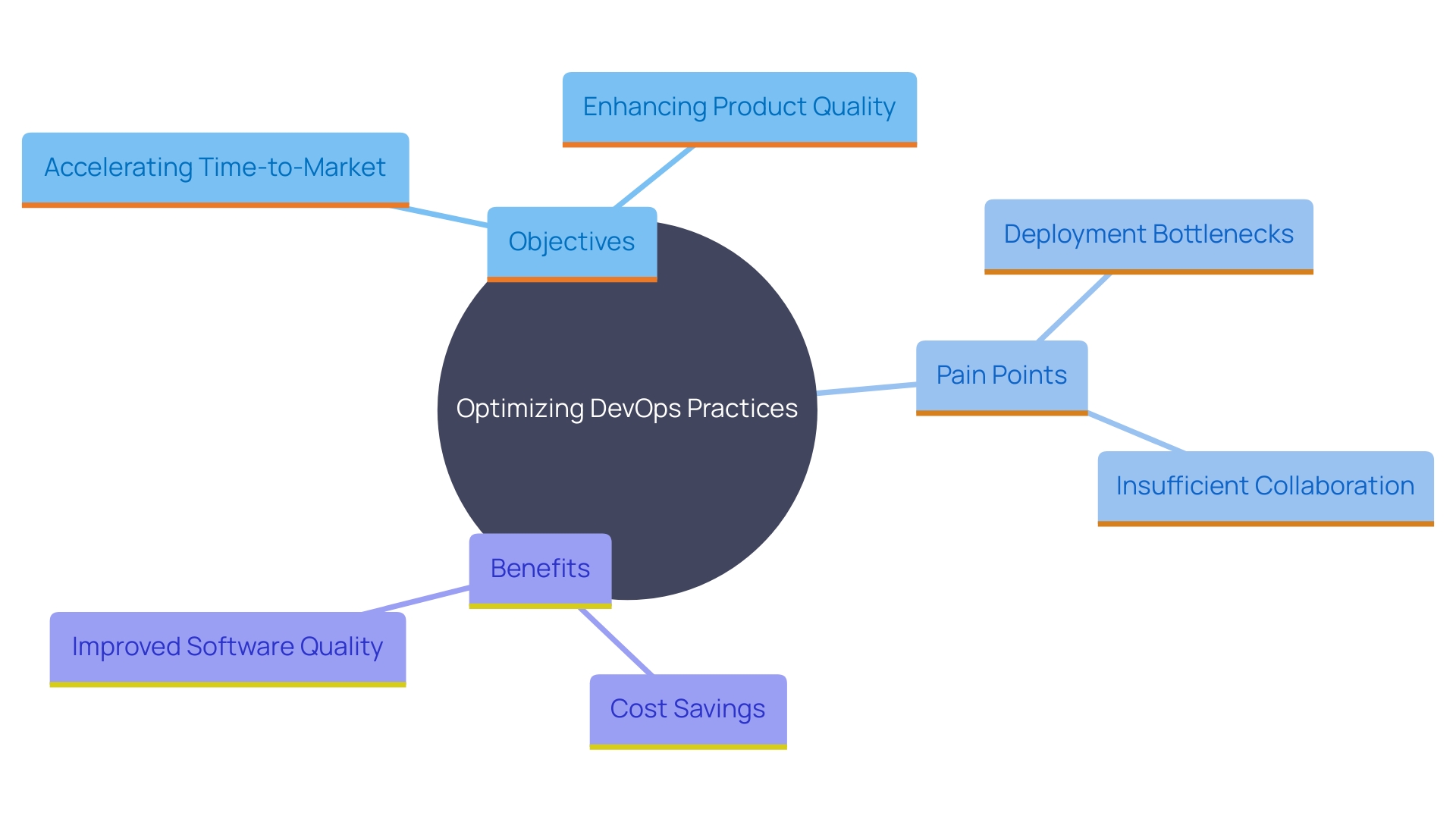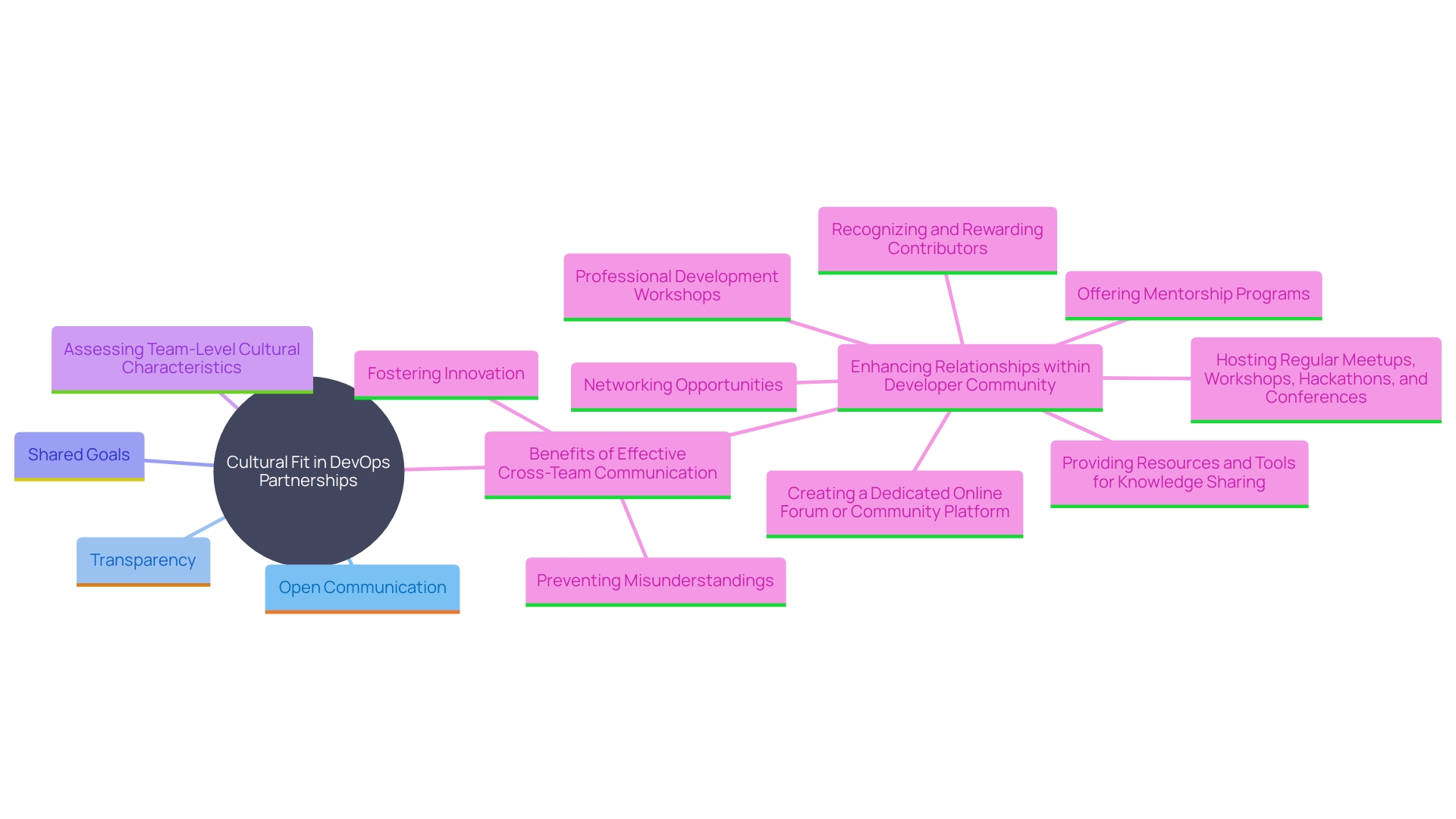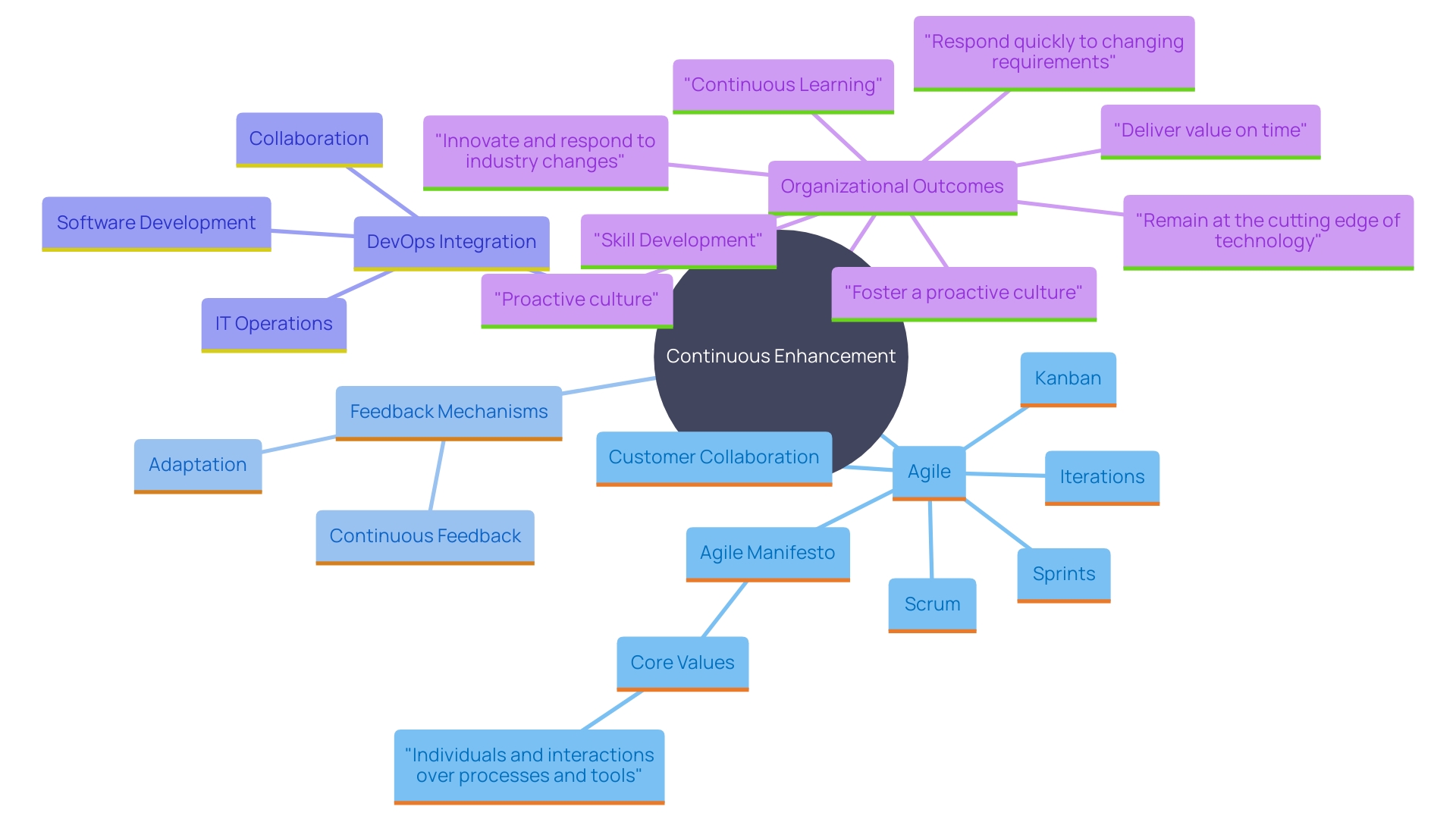Introduction
In today's rapidly evolving technological landscape, the integration of DevOps practices has become indispensable for organizations striving to enhance their software development and IT operations. This article delves into the critical aspects of successfully partnering with a DevOps company, beginning with understanding your unique DevOps needs. By identifying pain points and clearly defining objectives, businesses can align with partners who are well-suited to accelerate time-to-market, improve product quality, and foster better team communication.
Furthermore, the selection process for a DevOps company involves thorough evaluation of their expertise, particularly in cloud platforms and automation tools. The importance of a partner capable of addressing large-scale operational challenges effectively cannot be overstated. Additionally, the article examines the significance of security and compliance, highlights the necessity of technical expertise, and underscores the value of cultural fit and effective collaboration.
Finally, it emphasizes the role of continuous improvement and feedback in maintaining a competitive edge. By adopting a holistic approach that encompasses technical proficiency, strategic alignment, and a commitment to iterative development, organizations can achieve significant long-term cost savings, innovation, and operational excellence.
Understanding Your DevOps Needs
Recognizing your particular DevOps needs is crucial for effective cooperation with a software firm. Start by evaluating your current software development and operations workflows. Look for pain points such as deployment bottlenecks, insufficient team collaboration, and challenges in scalability. This strategic assessment helps in pinpointing key areas for improvement.
By clearly defining your objectives—whether it's accelerating time-to-market, enhancing product quality through continuous integration and delivery, or fostering better team communication—you can align more effectively with an organization capable of meeting these goals. Adopting practices of development and operations can lead to considerable long-term savings, with organizations seeing a 20% to 25% decrease in IT expenses over time, according to an IDC study. This is achieved through fewer software failures and quicker remediation of issues.
Moreover, adopting development and operations practices can yield higher quality products. Continuous integration ensures that code changes are consistently tested and validated, reducing defects and improving overall software quality. As mentioned by a financial officer from a tech firm, "Embracing this methodology has assisted us in decreasing our operational expenses by minimizing downtime and accelerating the production cycle.". This efficiency gain translates directly into cost savings.”
In 2023, the DevOps landscape is evolving with new trends and innovations reshaping how organizations develop, deploy, and manage software. Keeping updated on these trends will place your organization at the forefront of operational excellence, resulting in more efficient, resilient, and responsive software development and IT operations. The integration of development and operations not only optimizes IT processes but also aligns closely with business objectives, creating a leaner, more efficient operation.

Key Factors to Consider in a DevOps Company
When choosing a development and operations company, it's essential to assess their knowledge in cloud systems and their experience with automation instruments. Look for firms that demonstrate a profound understanding of both development and operations, ensuring they can seamlessly integrate with your existing workflows. For instance, Delivery Hero's IT team, including leaders like Dennis Zahrt, successfully streamlined their account recovery process for over 53,000 employees, reducing downtime significantly. This showcases the importance of a collaboration partner who can address large-scale operational challenges effectively.
Security and compliance are paramount, especially for enterprises handling sensitive data. 'Practices that combine development and operations with security, often called DevSecOps, significantly improve the protection of software applications.'. Furthermore, consider companies with a strong history in expense reduction and efficiency. TechAhead, for instance, has more than 14 years of expertise in implementation, leading to substantial long-term savings by automating essential elements of the software creation process. Their global teams in Los Angeles and Noida bring a wealth of experience, ensuring high efficiency and velocity in project execution.
Moreover, the tactical unification of development and operations can result in significant long-term financial savings, which are essential for reinvestment into the enterprise. This integration not only saves money but also enhances organizational agility and responsiveness to market changes. As emphasized by a financial officer from a tech company, implementing collaborative development practices has aided in decreasing operational expenses by minimizing downtime and accelerating development cycles. Consequently, selecting a collaborative partner with a demonstrated capacity to provide these advantages is crucial for accomplishing your business goals.
Assessing Technical Expertise
To ensure the technical expertise of potential partners in development and operations, it's crucial to delve into their team's certifications, experience with various technologies, and adherence to best practices. A proficient DevOps company should demonstrate mastery in continuous integration and continuous delivery (CI/CD), containerization, and cloud services. For example, integrating CI/CD practices allows developers to produce cleaner code and identify bugs before production, enhancing software quality and business agility.
Case studies, like the one from Sirius Technologies, demonstrate the advantages of standardized environments and secure practices. Developers at Sirius can create and dismantle development environments swiftly, leading to increased productivity and cost savings. Moreover, Docker's containerization platform exemplifies how applications can be developed, shipped, and run within lightweight containers, providing flexibility and security.
Engaging in technical discussions with potential partners can further reveal their capabilities. Asking about their use of tools like Docker and their approach to resource management can provide valuable insights. "As a statistic from recent surveys indicates, 48.6% of topics related to development and operations revolve around cloud and CI/CD tools, underscoring their importance in the field.". 'This hands-on experience is essential for managing the rapidly changing environment of development and operations tools and techniques, emphasizing the need for continuous learning and formal training approaches within organizations.'.
By thoroughly evaluating these aspects, you can identify a collaboration partner who not only meets technical requirements but also aligns with your strategic goals.
Evaluating Cultural Fit and Collaboration
Cultural fit is a critical yet often underestimated factor in the success of a DevOps partnership. Assessing an organization's capability to collaborate effectively with clients and adjust to different organizational cultures is essential. An organization that prioritizes open communication, transparency, and shared goals can significantly enhance productivity and outcomes. According to a comprehensive study, team-level cultural characteristics need to be individually analyzed in intercultural teams to harness their full potential. Effective cross-team communication can prevent misunderstandings and drive better results, ensuring smooth collaboration between different teams. This approach not only strengthens relationships but also fosters innovation and a sense of belonging within the developer community, ultimately leading to greater success.

The Role of Continuous Improvement and Feedback
A reputable technology operations company fosters a culture of continuous enhancement, essential for maintaining a competitive edge in the fast-paced digital landscape. Their approach to iterative development is grounded in methodologies like Agile, which emphasize cross-functional teams and customer collaboration. This iterative model, which includes frequent feedback loops and sprints, allows for rapid adaptation to changing requirements, ensuring timely delivery of value to clients.
Inquire about their feedback mechanisms, as these are pivotal in integrating lessons learned into future projects. Effective feedback loops can significantly enhance code quality, reduce technical debt, and improve overall developer experience. According to a study by DX, positive outcomes at the organizational level include improved retention, innovation, and profitability.
Furthermore, the strategic integration of DevOps can result in significant long-term savings. By minimizing overhead costs and optimizing IT processes, organizations can reinvest savings into innovations and new market expansions. This commitment to continuous improvement, coupled with a customer-centric approach, empowers clients to respond swiftly to market changes, reduce time-to-market, and achieve operational excellence.

Conclusion
Understanding and addressing the unique DevOps needs of an organization is paramount for successful collaboration with a development partner. By evaluating current workflows and identifying pain points, businesses can align their objectives with a DevOps company that is equipped to enhance product quality, accelerate time-to-market, and improve team communication. The adoption of DevOps practices not only leads to cost savings but also fosters a culture of continuous improvement and innovation.
When selecting a DevOps partner, it is essential to consider their technical expertise, particularly in cloud platforms, automation tools, and security practices. A company with a proven track record in handling large-scale operational challenges can provide the necessary support to navigate the complexities of software development. Moreover, a strong focus on cultural fit and collaboration can significantly enhance productivity and outcomes, ensuring that both teams work towards shared goals.
The commitment to continuous improvement and feedback is vital for maintaining a competitive edge in today's fast-paced digital landscape. By fostering an environment that encourages iterative development and effective communication, organizations can adapt swiftly to changing market demands. Ultimately, partnering with the right DevOps company can lead to significant long-term benefits, including operational excellence and enhanced innovation capabilities, positioning businesses for sustained success.




